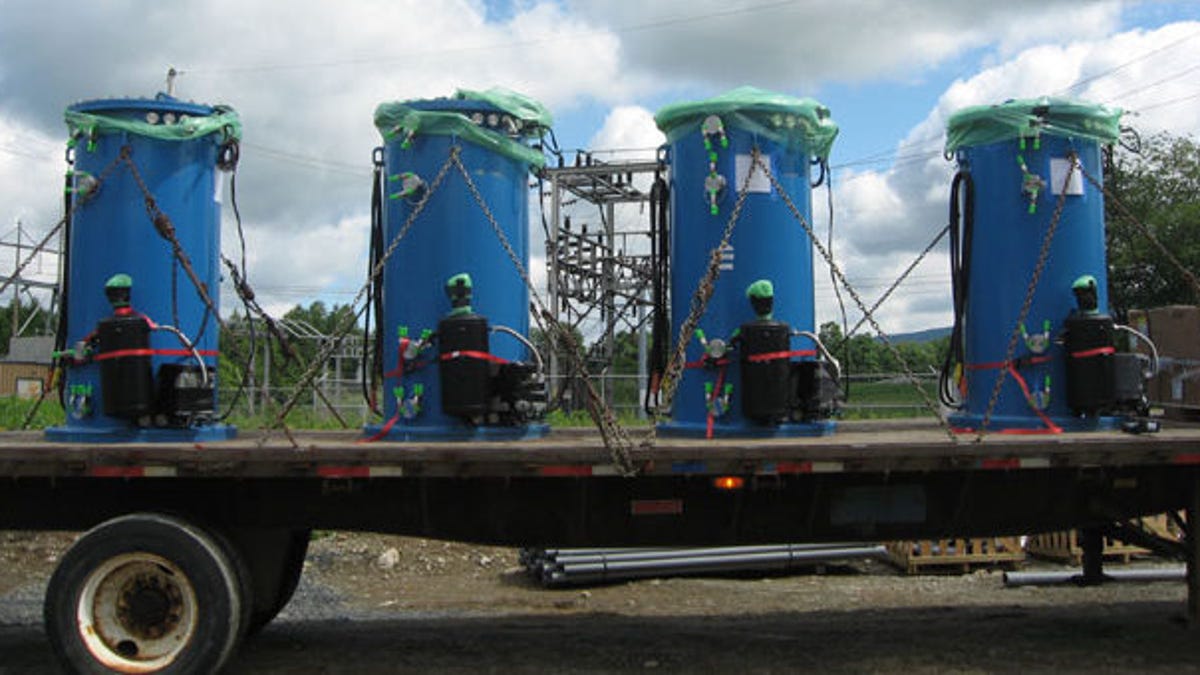Beacon Power: We're broke, but we're no Solyndra
Beacon Power, a flywheel storage company that received a government loan guarantee, said its storage plant will continue to operate as it seeks new sources of capital.

The CEO of Beacon Power, a government-backed energy storage company that has filed for bankruptcy protection, said today that the company could still survive.
Bill Capp released a statement (click for PDF) taking issue with comparisons to Solyndra, a solar collector maker that received a $535 million loan guarantee, then abruptly shut down at the end of August, declaring bankruptcy.
Beacon Power, which makes a flywheel storage system for steadying the grid's frequency, on Sunday filed for Chapter 11 bankruptcy protection. Both Solyndra and Beacon Power received loans through the Department of Energy's Loan Guarantee program, which immediately prompted comparisons between the two companies.
Capp listed a number of differences and indicated that, unlike Solyndra, Beacon Power has a shot of re-emerging from Chapter 11 as the same company. That's because Beacon Power's main source of revenue--a 20-megawatt storage facility partially financed by the federal government--will continue to operate and earn money.
"We will use the Chapter 11 process to more rapidly restructure our overhead, pursue potential investors, and definitively resolve our loan obligations. In the meantime, our 20MW flywheel plant in Stephentown is functioning at full capacity, and it is our intention for it to remain operational," he wrote.
However, the plant in Stephentown, N.Y., is not able to cover the company's costs. Beacon Power could earn more money from the operation because a recent regulatory change will reward its technology for rapidly bringing quick bursts of power online, Capp said.
He also indicated that the company's employees continue to work at a 20 percent pay reduction.
Solyndra's loan was substantially larger, Solyndra's factory is being auctioned off, and a controversial refinancing earlier this year means that Solyndra will pay $75 million in private loans before paying back the government, Capp said in his statement. Beacon Power has drawn $39.5 million of the Department of Energy's $43 million loan guarantee.
Lean financial times are nothing new for Beacon Power, which was spun out of SatCon Technology in 1997, and has spent an estimated $200 million on research and development for its high-tech storage device. A public company since 2000, Beacon Power earlier this month received a delisting notice from the Nasdaq because of its low stock price.
Since its Stephentown plant does not cover its costs, the company will need to raise additional funds to build other revenue-producing storage plants in order to get through the Chapter 11 restructuring process. The company also received state aid for its New York energy plant.
Industry observers expect that other companies that received federal money over the past few years will also likely run into financial problems. In one sign of trouble, lithium ion battery company Ener1, which received a $119 million loan to build a factory, was delisted from Nasdaq last week.
Updated at 5:12 p.m. PT with correction regarding delisting notice.

